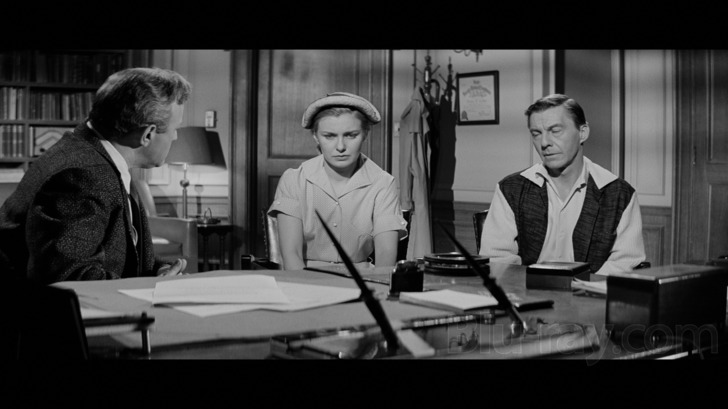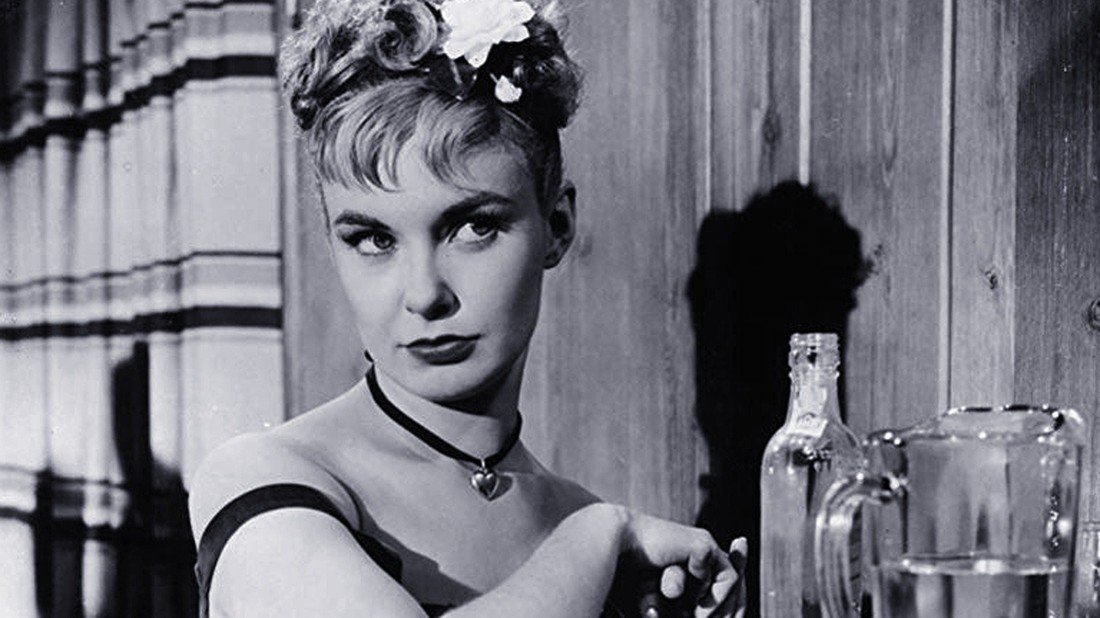← Back to Reviews
in
The Three Faces of Eve
A powerhouse performance from Joanne Woodward that won her an Oscar and a Golden Globe anchors the 1957 docudrama The Three Faces of Eve, an emotionally-charged look at a special kind of mental illness that features some hard-to-swallow and logic defying plot elements, but Woodward's performance allows the viewer to forgive most of what's wrong with the story.

The story actually begins with a lengthy introduction to the story by Alistair Cooke, speaking directly to the camera, explaining exactly what we are about to see. We are then transported to six years before this film's release, where we are introduced to Eve White, a timid housewife and mother whose bizarre behavior, including elaborate shopping sprees and wrapping a curtain cord around her daughter's neck have Eve and her husband looking for answers. While meeting with a sensitive psychiatrist named Dr. Luther, we learn that Mrs. White has an alternate personality named Eve Black, a hard-drinking party girl who is aware of Mrs. White, but Mrs. White knows nothing about her, which motivates Dr. Luther to have Ralph, Eve White's husband, commit her to treatment, which actually reveals a third personality who decides to call herself Jane.

This was unexplored territory for writer and director Nunnally Johnson and for moviegoers as well. The introduction of the Eve Black character is alternately funny and heartbreaking, as we watch a side of Eve that she really seems to enjoy, but has husband Ralph completely bamboozled. Once Eve is committed is where problems start occurring in the story...it seemed unbelievable that Eve White had no knowledge or control of Eve Black, yet Dr. Luther was able to talk to whichever personality he wanted simply by asking to speak to them. We never really get a sense of exactly what kind of treatment Eve is receiving for her disorder, save the occasional session of hypnosis. The appearance of the Jane personality also seems to come from nowhere, despite the fact that she is aware of both Eves. Multiple personalities are usually the result of a childhood trauma and the reveal of the trauma was a bit of a letdown but transitions to a satisfactory conclusion.

The real joy here was watching the gifted Joanne Woodward create three separate and distinct characters in Eve White, Eve Black, and Jane. These three women actually care very much about each other, even if they are denial about it and Woodward conveys this beautifully. Woodward nailed the ultimate acting challenge during the scene in which Eve Black pretends to be Eve White in order to seduce Ralph, even though she stated in her initial appearance that she hates Ralph. This was another minor plot point that initially nagged at me, but Woodward is so fascinating to watch in the scene that I was able to let it slide.

Joanne Woodward has done a lot of incredible work in her long and distinguished career, but this is still her finest and most complex performance, which earned her a richly deserved Oscar and Globe. Lee J. Cobb is beautifully understated as Dr. Luther and David Wayne offers the performance of his career as well as the perplexed Ralph White. Future stars Vince Edwards and Nancy Kulp can also be glanced in small roles, but Joanne Woodward is the one you come away from this one remembering, with a slight chill going down your spine while you do.
A powerhouse performance from Joanne Woodward that won her an Oscar and a Golden Globe anchors the 1957 docudrama The Three Faces of Eve, an emotionally-charged look at a special kind of mental illness that features some hard-to-swallow and logic defying plot elements, but Woodward's performance allows the viewer to forgive most of what's wrong with the story.

The story actually begins with a lengthy introduction to the story by Alistair Cooke, speaking directly to the camera, explaining exactly what we are about to see. We are then transported to six years before this film's release, where we are introduced to Eve White, a timid housewife and mother whose bizarre behavior, including elaborate shopping sprees and wrapping a curtain cord around her daughter's neck have Eve and her husband looking for answers. While meeting with a sensitive psychiatrist named Dr. Luther, we learn that Mrs. White has an alternate personality named Eve Black, a hard-drinking party girl who is aware of Mrs. White, but Mrs. White knows nothing about her, which motivates Dr. Luther to have Ralph, Eve White's husband, commit her to treatment, which actually reveals a third personality who decides to call herself Jane.

This was unexplored territory for writer and director Nunnally Johnson and for moviegoers as well. The introduction of the Eve Black character is alternately funny and heartbreaking, as we watch a side of Eve that she really seems to enjoy, but has husband Ralph completely bamboozled. Once Eve is committed is where problems start occurring in the story...it seemed unbelievable that Eve White had no knowledge or control of Eve Black, yet Dr. Luther was able to talk to whichever personality he wanted simply by asking to speak to them. We never really get a sense of exactly what kind of treatment Eve is receiving for her disorder, save the occasional session of hypnosis. The appearance of the Jane personality also seems to come from nowhere, despite the fact that she is aware of both Eves. Multiple personalities are usually the result of a childhood trauma and the reveal of the trauma was a bit of a letdown but transitions to a satisfactory conclusion.

The real joy here was watching the gifted Joanne Woodward create three separate and distinct characters in Eve White, Eve Black, and Jane. These three women actually care very much about each other, even if they are denial about it and Woodward conveys this beautifully. Woodward nailed the ultimate acting challenge during the scene in which Eve Black pretends to be Eve White in order to seduce Ralph, even though she stated in her initial appearance that she hates Ralph. This was another minor plot point that initially nagged at me, but Woodward is so fascinating to watch in the scene that I was able to let it slide.

Joanne Woodward has done a lot of incredible work in her long and distinguished career, but this is still her finest and most complex performance, which earned her a richly deserved Oscar and Globe. Lee J. Cobb is beautifully understated as Dr. Luther and David Wayne offers the performance of his career as well as the perplexed Ralph White. Future stars Vince Edwards and Nancy Kulp can also be glanced in small roles, but Joanne Woodward is the one you come away from this one remembering, with a slight chill going down your spine while you do.
